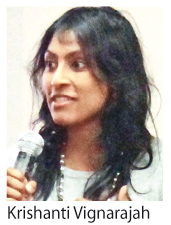
School and tertiary education drop-outs due to the early marriage custom in Asia and South East Asia is a major impediment to empower women in the region, Asian University for Women (AUW) Dean of Faculty, Dr. Rosie Bateson told a forum on ‘Women’s Education and Economic Empowerment’ conducted by Hemas Holdings last week. She said the underage marriage makes them live as partners even at universities which is an obstacle to focus and pursue education.
 “Many young students at AUW are married. As a result their attention is divided even thought they want to take up higher roles in society and make a salient contribution to the economy,” Dr. Bateson said.
“Many young students at AUW are married. As a result their attention is divided even thought they want to take up higher roles in society and make a salient contribution to the economy,” Dr. Bateson said.
AUW alumni said parents need to repose faith in their daughters who having graduated are assets to the country. AUW graduates said though parents lack confidence in their daughters securing employment back in the country later they realized the value of investing in education which open up opportunities in diverse sectors.
“We did not have to wait for employment after graduation. We were sought by employers,” an AUW alumni said. Krishanti Vignarajah, a Sri Lankan American advisor to AUW, Bangladesh and former policy director to the office of First Lady Michelle Obama said where you are born does not matter to where you could head in life.
Vignaraja who was born in the North had to leave the country at the age of nine months due to the conflict that shut the doors for opportunities in education. Her parents planned to migrate to Northern Nigeria but realized it was no better due to the harassment of women by the Bokhara group which kept over half of women in the country out of schools.
“By God’s grace we were able to go to America which opened the doors for education and employment. I pursued education and realized the difference it could make,” Vignarajah said. From a gloomy past, Vignarajah by her endurance and determination ended up in the White House as the policy director to former First Lady and spearheaded the ‘Let the Girls Learn’ initiative focused on secondary education in the US. In her new role with AUW she advocates tertiary education and leadership development among women in the Asian region. AUW is home to around 600 women from 16 countries. Fifty three Sri Lankans have graduated and 10 are enrolled each year to the university.
Among Sri Lankan graduates are an Oxford Masters graduate and staff members at the UNDP, UNV, World Vision, Good Neighbors International, Centre for Poverty Analysis, Center for Environmental Justice and Women’s Action Network. “There are opportunities if one takes education seriously. There are for girls and boys as well in the US.
The office of the First Lady worked with women in South Korea, Japan, UK and many other countries in Asia,” Vignarajah said. She said there is no limit to what women could do and achieve if we invest in their education. AUW alumna Kaushalya Ariyathilaka, a graduate from the University of Trento, Italy and an exchange student at Stanford University said students should not think that simply because they study biology in school they should do the same in tertiary education.
“There is a misconception that subjects related to science are the best subjects. I studied political science and philosophy. One must pursue his or her ambitions,” Ariyathilaka said.
She recalled how mothers in her home town in Trincomalee at a community centre started tearing when she spoke of where one could end up when educated. AUW alumna Abiramy Sivalognanthan who hails from the North, said being at the AUW she understood what diversity in culture is and that no culture is above others.
“My culture or religion is not the best. We need to respect other cultures and religions,” she said.
